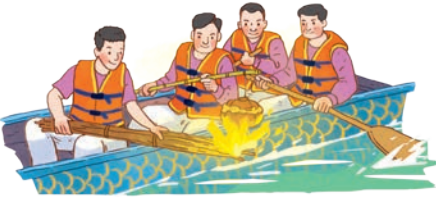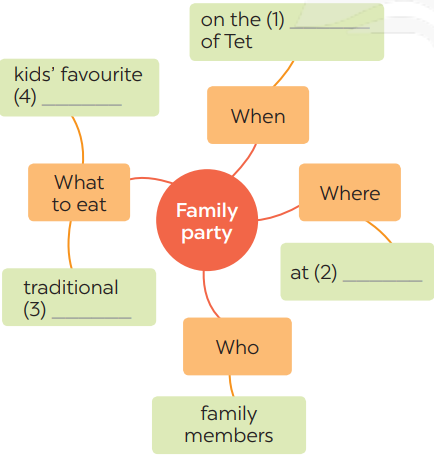Tiếng Anh 8 Unit 5 Skills 11. Work in pairs. Look at the pictures and answer the following questions. 2. Read the text. Choose the correct answer A, B or C. 3. Read the text again. Complete the mind map about a family party. 4. Work in pairs. Put the questions (A - E) in the correct blanks (1- 5) to make a complete dialogue. Then role-play it. 5. Make notes about a normal family event that you take part in. Use the questions below as cues. GÓP Ý HAY - NHẬN NGAY QUÀ CHẤT Gửi góp ý cho HocTot.Nam.Name.Vn và nhận về những phần quà hấp dẫn
Lựa chọn câu để xem lời giải nhanh hơn
Bài 1 Video hướng dẫn giải Reading 1. Work in pairs. Look at the pictures and answer the following questions. (Làm việc theo cặp. Nhìn vào các hình ảnh và trả lời các câu hỏi sau đây.)
1. What are the men doing? (Những người đàn ông đang làm gì?) 2. When do you think this event occurs? (Bạn nghĩ sự kiện này xảy ra khi nào?) Lời giải chi tiết: 1. Farmers compete cooking rice on boat. (Nông dân thi nấu cơm trên thuyền.) 2. I think it’s occur in the Lunar New Years. (Mình nghỉ là nó diễn ra Tết Nguyên Đán.) Bài 2 Video hướng dẫn giải 2. Read the text. Choose the correct answer A, B or C. (Đọc văn bản. Chọn câu trả lời đúng A, B hoặc C.) A village festival day I live in a small village in northern Viet Nam. Every year, people in my village look forward to the third day of Tet. It is one of our most important festival days. In the morning, we gather along the riverside to watch some competitions. First, there is a special boat race. Some team members cook rice on the boat while others row the boat as fast as they can. The fastest team with well-cooked rice wins the race. Then, the referee releases a duck into the middle of the river. Contestants jump into the river to catch it. The atmosphere becomes loud with the sound of drums and cheers of festival goers. At noon, there is a village party at the communal house for the elders. Each family also holds a home party. We cook traditional dishes like sticky rice and steamed chicken. Sometimes, we include food that children love, such as bun cha or even pizzas! The village festival helps us maintain our traditions, connect with other people, and strengthen our family bonds. 1. What is the text mainly about? A. A local tradition. B. A family tradition. C. A cooking contest. 2. To win the boat race, a team must _________. A. row the boat more quickly than the other teams B. be the fastest boat and properly cook the rice C. cook rice properly and catch the duck 3. The phrase “releases a duck” in the text means __________. A. gives it freedom B. catches it C. takes it home 4. Why is the festival important? A. Because it is exciting. B. Because people win valuable prizes. C. Because it keeps some village traditions alive. Phương pháp giải: Tạm dịch: Một ngày hội làng Tôi sống trong một ngôi làng nhỏ ở miền Bắc Việt Nam. Mỗi năm, người trong làng tôi đều mong chờ đến mùng 3 Tết. Nó là một trong những ngày hội quan trọng nhất của chúng tôi. Vào buổi sáng, chúng tôi tập tring bên bờ sông để xem các cuộc thi, Đầu tiên là cuộc đua thuyền đặc biệt. Vài thành viên trong nhóm nấu cơm trên thuyền trong khi những người khác đua thuyền nhanh nhất có thể. Nhóm về đích nhanh nhất và cơm nấu ngon nhất sẽ thắng. Sau đó, trọng tài thả một con vịt ra giữa sông. Những thí sinh nhảy xuống sông để bắt nó. Không khí trở nên ồn vào với tiếng trống và tiếng cổ vũ của những người đi hội. Vào buổi trưa, có một bữa tiệc trong làng ở đình làng cho các cụ. Mỗi gia đình cũng tổ chức một bữa tiệc ở nhà. Họ nấu những món truyền thống như xôi nếp và gà luộc. Đôi khi chúng tôi cũng có những món mà bọn trẻ thích như bún chả hay thậm chí cả pizza! Lễ hội làng giúp duy trì truyền thống, kết nối mọi người cùng nhau, và thắt chặt mối liên kết trong gia đình. 1. Văn bản chủ yếu nói về điều gì? A. Một truyền thống địa phương. B. Truyền thống gia đình. C. Một cuộc thi nấu ăn. 2. Để giành chiến thắng trong cuộc đua thuyền, một đội phải _________. A. chèo thuyền nhanh hơn các đội khác B. là thuyền nhanh nhất và nấu cơm đúng cách C. nấu cơm ngon và bắt vịt 3. Cụm từ “thả vịt” trong văn bản có nghĩa là __________. A. cho nó tự do B. bắt nó C. mang nó về nhà 4. Tại sao lễ hội lại quan trọng? A. Bởi vì nó thú vị. B. Bởi vì mọi người giành được giải thưởng có giá trị. C. Bởi vì nó giữ cho một số truyền thống của làng tồn tại. Lời giải chi tiết:
1. A What is the text mainly about? A local tradition. (Ý chính của bài đọc là gì? Một truyền thống địa phương.) 2. B To win the boat race, a team must be the fastest boat and properly cook the rice. (Để thắng cuộc đua thuyền, một nhóm phải là con thuyền nhanh nhất và nấu cơm ngon.) Thông tin: The fastest team with well-cooked rice wins the race. (Nhóm về đích nhanh nhất và cơm nấu ngon nhất sẽ thắng.) 3. A The phrase “releases a duck” in the text means gives it freedom. (Cụm từ “thả con vịt” trong bài đọc nghĩa là trả tự do.) Thông tin: Then, the referee releases a duck into the middle of the river. (Sau đó, trọng tài thả một con vịt ra giữa sông.) 4. C Why is the festival important? Because it keeps some village traditions alive. (Tại sao lễ hội lại quan trọng? Vì nó giữ truyền thống trong làng tồn tại.) Thông tin: The village festival helps us maintain our traditions, connect with other people, and strengthen our family bonds. (Lễ hội làng giúp duy trì truyền thống, kết nối mọi người cùng nhau, và thắt chặt mối liên kết trong gia đình.) Bài 3 Video hướng dẫn giải 3. Read the text again. Complete the mind map about a family party. (Đọc văn bản một lần nữa. Hoàn thành sơ đồ tư duy về một bữa tiệc gia đình.)
Lời giải chi tiết: Family party (Tiệc gia đình) Who: Family members (Ai: thành viên gia đình) When: on the (1) third day of Tet (Khi nào: mùng 3 Tết) Where: at (2) their house (Ở đâu: nhà họ) What to eat: traditional (3) dishes (sticky rice and steamed chicken) / kid's favourite (4) food (bun cha or pizzas) (Ăn gì: đồ ăn truyền thống (xôi nếp và gà luộc)/ đồ ăn trẻ em thích (bún chả hoặc pizza). Bài 4 Video hướng dẫn giải Speaking 4. Work in pairs. Put the questions (A - E) in the correct blanks (1- 5) to make a complete dialogue. Then role-play it. (Làm việc theo cặp. Đặt các câu hỏi (A - E) vào chỗ trống thích hợp (1- 5) để tạo thành một đoạn hội thoại hoàn chỉnh. Sau đó đóng vai.) A. And what do you do at parties? B. Lan, what family event do you often take part in? C. Do you like these parties? D. Where do you hold these parties? E. Who joins you at these parties? Nick: (1) ____________________________ Lan: Well, I join birthday parties of all my family members. Nick: (2) ____________________________ Lan: In a Vietnamese restaurant. But sometimes we break with tradition by going to a Western one. Nick: (3) ____________________________ Lan: Everyone in my family. Nick: (4) ____________________________ Lan: Well, the birthday person opens the gifts. And everyone has some good food. Nick: (5) ____________________________ Lan: Yes, I always look forward to them. They are a great time for family bonding. Lời giải chi tiết:
Nick: (1) B. Lan, what family event do you often take part in? (Lan, sự kiện nào mà cậu thường tham gia?) Lan: Well, I join birthday parties of all my family members. (Ờm…, mình tham gia bữa tiệc sinh nhật của các thành viên trong gia đình.) Nick: (2) D. Where do you hold these parties? (Nhà cậu tổ chức các bữa tiệc đó ở đâu?) Lan: In a Vietnamese restaurant. But sometimes we break with tradition by going to a Western one. (Ở một nhà hàng Việt Nam. Nhưng đôi khi tụi mình phá lệ bằng việc đi đến một nhà hàng châu Âu.) Nick: (3) E. Who joins you at these parties? (Ai tham gia những bữa tiệc đó?) Lan: Everyone in my family. (Mọi người trong gia đình mình.) Nick: (4) A. And what do you do at parties? (Và mọi người làm gì ở các bữa tiệc?) Lan: Well, the birthday person opens the gifts. And everyone has some good food. (Thì, người có sinh nhật mở quà. Và mọi người ăn đồ ăn ngon.) Nick: (5) C. Do you like these parties? (Cậu có thích những bữa tiệc này không?) Lan: Yes, I always look forward to them. They are a great time for family bonding. (Có, mình luôn mong ngóng chúng. Vì đó là thời gian tuyệt vời cho những mối quan hệ trong gia đình.) Bài 5 Video hướng dẫn giải 5. Make notes about a normal family event that you take part in. Use the questions below as cues. (Ghi chú về một sự kiện gia đình bình thường mà bạn tham gia. Sử dụng các câu hỏi dưới đây làm gợi ý.) - What is the event? (Sự kiện là gì?) - Where and when does it happen? (Nó xảy ra ở đâu và khi nào?) - Who joins with you? (Ai tham gia với bạn?) - What do you often do at that event? (Bạn thường làm gì tại sự kiện đó?) - Do you like it or not? Why or why not? (Bạn có thích nó hay không? Tại sao hay tại sao không?) Now work in pairs. Make a dialogue asking and answering about the event. You can use your notes. (Bây giờ làm việc theo cặp. Tạo một cuộc hội thoại hỏi và trả lời về sự kiện. Bạn có thể sử dụng ghi chú của mình.) Lời giải chi tiết: An: Bao, what family event do you often take part in? (Bao, sự kiện gia đình nào mà cậu thường tham gia?) Bao: It’s the family reunion party at the end of the year. (Đó là bữa tiệc đoàn tụ gia đình vào cuối năm.) An: Where do you hold these parties? (Nhà cậu tổ chức các bữa tiệc đó ở đâu?) Bao: It holds in my grandparents’ house. (Nó được tổ chức ở nhà ông mà mình.) An: Who joins you at these parties? (Ai tham gia những bữa tiệc đó?) Bao: Every family members gather at my grandparent’s house. (Mọi thành viên trong gia đình tập trung tại nhà ông bà mình.) An: And what do you do at parties? (Và mọi người làm gì ở các bữa tiệc?) Bao: We have lots of good food and each other tells what happened to them in a year. (Nhà mình đã được ăn nhiều đồ ăn ngon và mỗi người kể chuyện xảy ra về họ trong 1 năm.) An: Do you like these parties? (Cậu có thích những bữa tiệc này không?) Bao: Yes, I always look forward to them. They are a great time for family bonding. (Có, mình luôn mong ngóng chúng. Vì đó là thời gian tuyệt vời cho những mối quan hệ trong gia đình.)
>> Học trực tuyến lớp 8 trên Tuyensinh247.com. Đầy đủ khoá học các bộ sách: Kết nối tri thức với cuộc sống; Chân trời sáng tạo; Cánh diều. Cam kết giúp học sinh lớp 8 học tốt, hoàn trả học phí nếu học không hiệu quả. PH/HS tham khảo chi tiết khoá học tại: Link
|





















